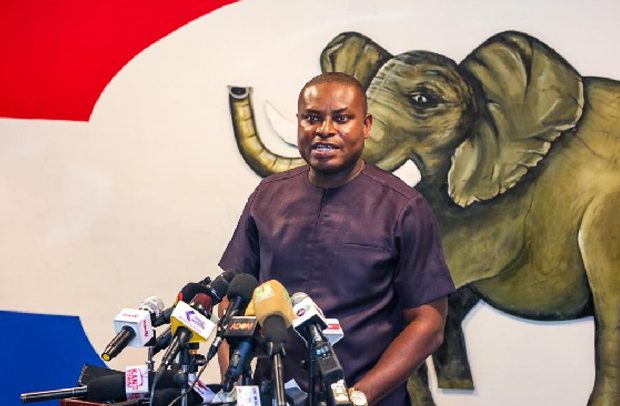Richard Ahiagbah
The New Patriotic Party (NPP), has called on the National Democratic Congress (NDC), to provide alternative solutions to the current economic challenges facing the country rather than consistently making the NPP government unpopular with false claims and tags, and in denial of obvious global economic realities.
Addressing journalists at a news conference in Accra yesterday, the Director of Communications of the NPP, Richard Ahiagbah said the NDC has no moral authority and economic clout to criticise the NPP government after supervising a decline of the economic performance of the country from 2013 to 2016.
He said, “On the performance of the larger economy which is measured in terms of GDP, the NDC supervised a perpetual decline from 2013 to 2016. In 2013, GDP was 7.3%; 2014 it was 4%; 2015 it was 3.9% and in 2016 it was 3.7%.”
He explained that in terms of percentage changes in GDP, the economy deteriorated by 45.2% in 2014 compared to economic growth in 2013, with a decreased in economic growth by 2.5% in 2015 and 5.12% in 2016.
According to him, in the real sector, which includes agriculture industry and service, the NDC had the worst performance, plummeting significantly in all sectors at a negative rate from 2014 using 2013 performance as a base.
The Communications Director further explained that the NDC failed to maintain the successes chalked by the NPP after inheriting an economy which had discovered oil in commercial quantities and began production in 2010, shooting Ghana’s GDP to 14% in 2011.
“Poor performance in the real sector means that the vulnerable in our society, the poor, the vast majority of Ghanaians were impoverished under Ex-President Mahama and the NDC,” he added.
He further indicated that year-on-year inflation under the NDC government was 13.5 per cent in 2013 and 17 per cent in 2014, which further increased to 17.7 per cent in 2015.
According him, despite NDC inheriting significant oil revenue inflows and International Monetary Fund (IMF) programme support in 2015, Ghana’s economy continued not only to deteriorate, but also experienced sustained deterioration of the cedi against the US dollar.
“On GDP, in 2017, GDP grew at 8.1 per cent compared to 3.7 per cent in 2016. In 2018, GDP grew by 6.3%, 2019 GDP grew by 6.5%, and 2020 GDP grew by 0.5%.
“In the Real sector, industry recorded its highest growth of 16.7% in 2017, Agriculture 8.4% and the Services sectors 4.3%. Industry grew from a mournful negative 0.5% in 2016 to 16.7% in 2017. Services grew from 2.8% in 2016 to an appreciable 4.3% in 2017. The Agric sector grew from a dismal 2.7% in 2016 to 8.4% in 2017. The implication of this data shows that the vulnerable in our society, the poor, indeed, the vast majority of Ghanaians fared much much better under NPP in 2017. Data is sacred,” he explained.
He also mentioned that the NPP had not over borrowed, as the NDC continues to churn out unsubstantiated rumours into the public domain, but instead, the NPP has sustained economic growth on all fronts until the COVID-19 disruption in 2020. Mr. Ahiagbah however assured Ghanaians of government’s resolve to “build back the economy quicker and restore fiscal rectitude” despite the economic challenges.
By Ebenezer K. Amponsah

